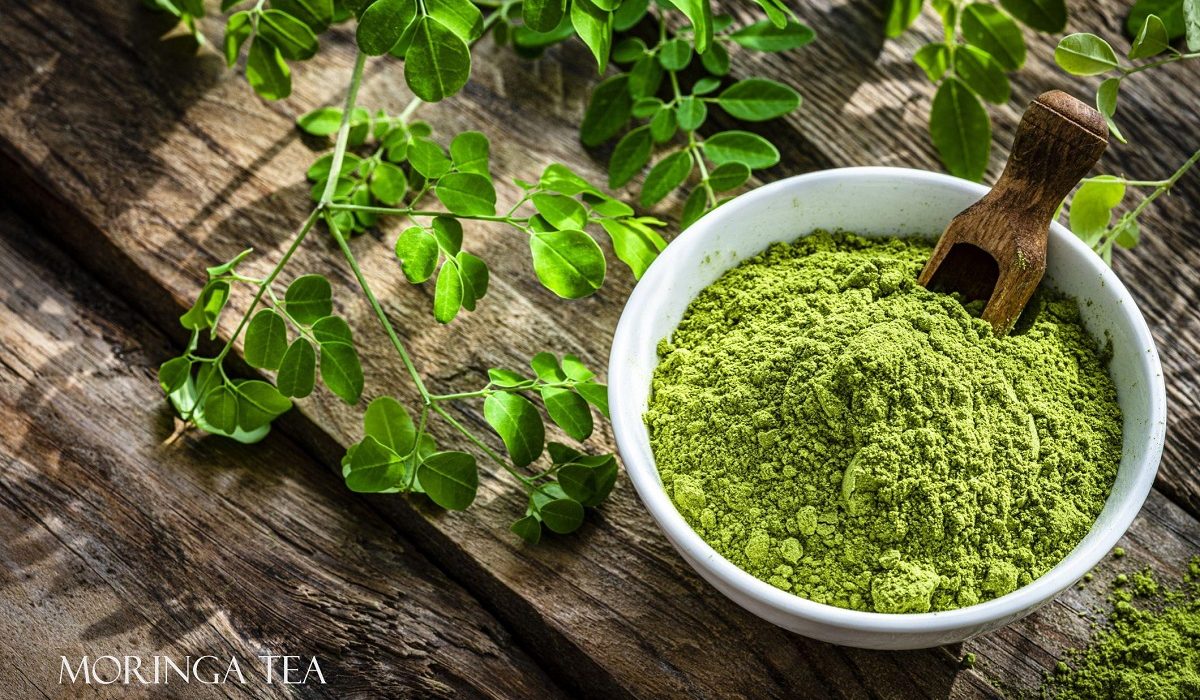Moringa tea, derived from the leaves of the Moringa oleifera tree, is a powerhouse of nutrition and wellness. Known as the “Miracle Tree” or “Drumstick Tree,” Moringa is revered in traditional medicine systems for its numerous health benefits. When brewed into tea, it offers a soothing beverage packed with antioxidants, vitamins, and essential nutrients. This tea is caffeine-free, making it an excellent alternative to traditional teas for promoting energy and relaxation without jitters. Its earthy flavor and therapeutic properties have gained global recognition, making it a staple in health-conscious households.
Nutritional Values in Moringa
Moringa is a nutrient-dense superfood. Its leaves are loaded with essential vitamins, minerals, and bioactive compounds, which make Moringa tea a potent health elixir. Key nutritional highlights include:
Vitamins: Moringa is rich in Vitamin A (beta-carotene), Vitamin C, and B-complex vitamins like B1, B2, and B3, which support immunity, energy production, and skin health.
Minerals: High levels of calcium, magnesium, potassium, and iron in Moringa promote bone health, muscle function, and oxygen transport in the body.
Antioxidants: Contains powerful antioxidants such as quercetin, chlorogenic acid, and flavonoids that combat oxidative stress and reduce inflammation.
Proteins: Moringa leaves are a rare plant-based source of complete protein, containing all nine essential amino acids.
Fiber: Supports digestive health and aids in maintaining stable blood sugar levels.
Making Moringa Tea from Fresh Leaves and Powder
Recipe From Fresh Leaves:
To make a refreshing and nutritious cup of tea with Moringa, start by harvesting fresh Moringa leaves. Rinse them thoroughly to remove any dirt or impurities. Next, boil 2 cups of water and add a handful of the clean Moringa leaves. Reduce the heat and let the leaves simmer for 5-7 minutes, or until the water turns a light green color. Once the tea has steeped, strain it into a cup. For a more flavorful experience, consider adding a squeeze of lemon or a spoonful of honey. Enjoy your homemade tea with Moringa, a natural elixir packed with essential vitamins and minerals.
Recipe From Moringa Powder:
To make a delicious and nutritious cup of tea with Moringa, start by selecting high-quality, organic Moringa powder for the best flavor and health benefits. Boil 2 cups of water and remove it from the heat. Stir in 1 teaspoon of Moringa powder and let it steep for 3-5 minutes, stirring occasionally. Strain the tea to remove any undissolved particles. For a sweeter taste, add natural sweeteners like honey to your liking. Enjoy your cup of tea made with Moringa, a powerful elixir packed with antioxidants and essential nutrients.
Benefits of Moringa Tea
Tea of Moringa is a nutritional treasure trove with an array of health benefits. Here’s a closer look at its impact on wellness:
Boosts Immunity
Tea of Moringa is a natural immune booster, packed with essential nutrients and antioxidants. Vitamin C in moringa stimulates white blood cell production, while antioxidants combat harmful free radicals. Its anti-inflammatory properties reduce inflammation, strengthening the immune system. Additionally, minerals like iron and zinc, present in moringa, play a vital role in immune function. By incorporating moringa tea into your daily routine, you can naturally enhance your body’s defense against illnesses.
Supports Digestive Health
Moringa tea supports digestive health due to its rich nutrient content and potential therapeutic properties. It contains antioxidants that combat oxidative stress, reducing inflammation in the digestive tract. The fiber in moringa tea promotes regular bowel movements and aids in digestion. Additionally, it may help regulate stomach acid levels, potentially preventing conditions like ulcers. Some studies suggest that moringa’s antibacterial properties may help inhibit harmful bacteria in the gut.
Promotes Weight Loss
Tea of Moringa may aid in weight loss through several mechanisms. Its high fiber content promotes satiety, reducing overall calorie intake. Additionally, moringa’s potential to regulate blood sugar levels can help prevent sugar cravings and overeating. Some studies suggest that moringa may boost metabolism, leading to increased calorie burn. However, it’s important to note that moringa tea alone is unlikely to lead to significant weight loss. Incorporating it into a balanced diet and regular exercise routine is crucial for optimal results.
Regulates Blood Sugar Levels
Tea of Moringa may help regulate blood sugar levels by enhancing insulin sensitivity, slowing down carbohydrate absorption, and promoting healthy blood sugar metabolism. Certain compounds in moringa, like quercetin, may help regulate enzymes involved in glucose metabolism. However, it’s important to consult with a healthcare professional before using moringa tea to manage blood sugar, especially if you have diabetes or are taking medications.
Improves Heart Health
Tea of Moringa is packed with antioxidants like quercetin, which combat oxidative stress and reduce inflammation, both linked to heart disease. Some studies suggest it may lower LDL (bad) cholesterol, a major heart disease risk factor. The potassium and magnesium in moringa can help regulate blood pressure by balancing sodium levels and promoting vasodilation. Additionally, moringa may enhance blood circulation, ensuring proper oxygen and nutrient delivery to the heart. While these findings are promising, more research is needed to fully understand its impact on heart health. It’s essential to consult with a healthcare professional before incorporating moringa tea into your routine, especially if you have underlying heart conditions or are taking medications.
Enhances Skin Health
Tea of Moringa can enhance skin health due to its rich antioxidant content. It helps combat oxidative stress, which can lead to premature aging and wrinkles. The vitamins and minerals in this tea nourish the skin, promoting a healthy glow. Additionally, its anti-inflammatory properties can help soothe skin irritations and reduce acne breakouts. By promoting cell turnover, moringa tea can help reduce the appearance of dark spots and uneven skin tone
Strengthens Bones
Tea of Moringa is a natural powerhouse for bone health. It’s rich in essential minerals like calcium, phosphorus, and magnesium, which are crucial for building and maintaining strong bones. Additionally, vitamin K, found in moringa, works synergistically with vitamin D to improve calcium absorption and bone mineralization. Regular consumption of moringa tea can help reduce the risk of bone-related disorders like osteoporosis, especially as we age.
Reduces Inflammation
Tea of Moringa is a natural anti-inflammatory powerhouse. Its rich antioxidant content, particularly quercetin, helps combat oxidative stress, a major contributor to inflammation. By reducing inflammation, moringa tea can alleviate symptoms of various inflammatory conditions, including arthritis, allergies, and skin disorders. It may also help soothe digestive issues and reduce muscle soreness after exercise. Regular consumption of moringa tea can contribute to overall well-being by reducing inflammation throughout the body.
Detoxifies the Body
Tea of Moringa is a natural detoxifier that helps cleanse the body of harmful toxins. Its high fiber content promotes regular bowel movements, aiding in the elimination of waste products. Additionally, the antioxidants in moringa tea neutralize harmful free radicals, reducing oxidative stress and supporting liver function. This detoxification process can improve overall health, boost energy levels, and enhance skin complexion. By incorporating moringa tea into your daily routine, you can support your body’s natural detoxification processes.
Improves Mental Clarity and Mood
Tea of Moringa can enhance mental clarity and mood due to its various properties. The antioxidants in moringa help reduce oxidative stress, which can impair cognitive function. Additionally, the vitamins and minerals in moringa, such as iron and vitamin B6, support brain health and neurotransmitter function. Regular consumption of moringa tea may improve focus, memory, and overall mood. It can also help reduce symptoms of anxiety and depression, promoting a positive mental outlook.
Side Effects of Moringa Tea
While Tea of Moringa is generally safe, it’s essential to be cautious. Excessive consumption may lead to digestive discomfort like stomach upset, diarrhea, or cramping due to its high fiber content. Moringa tea may interact with medications for diabetes, blood pressure, or thyroid disorders. Pregnant women should avoid large quantities as it might cause uterine contractions, and nursing mothers should consult a doctor before use. Although rare, allergic reactions like itching, swelling, or breathing difficulties are possible. To ensure safe usage, it’s advisable to consult a healthcare provider, especially if you have underlying health conditions or are taking medications
Conclusion
Moringa tea is a versatile, nutrient-rich beverage that offers a myriad of health benefits, from boosting immunity and improving digestion to promoting heart health and radiant skin. Whether prepared from fresh leaves or powder, this herbal tea is easy to incorporate into your daily routine. While it’s a safe and natural option for most, moderation is key, and it’s always wise to consult a healthcare provider if you have underlying conditions or are on medication. Embrace the goodness of Moringa and let this miracle beverage become a cornerstone of your wellness journey.
Follow us on our WhatsApp or Telegram Channel
Click Here to talk to our experts.






